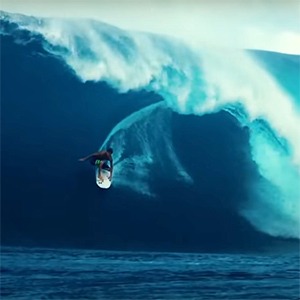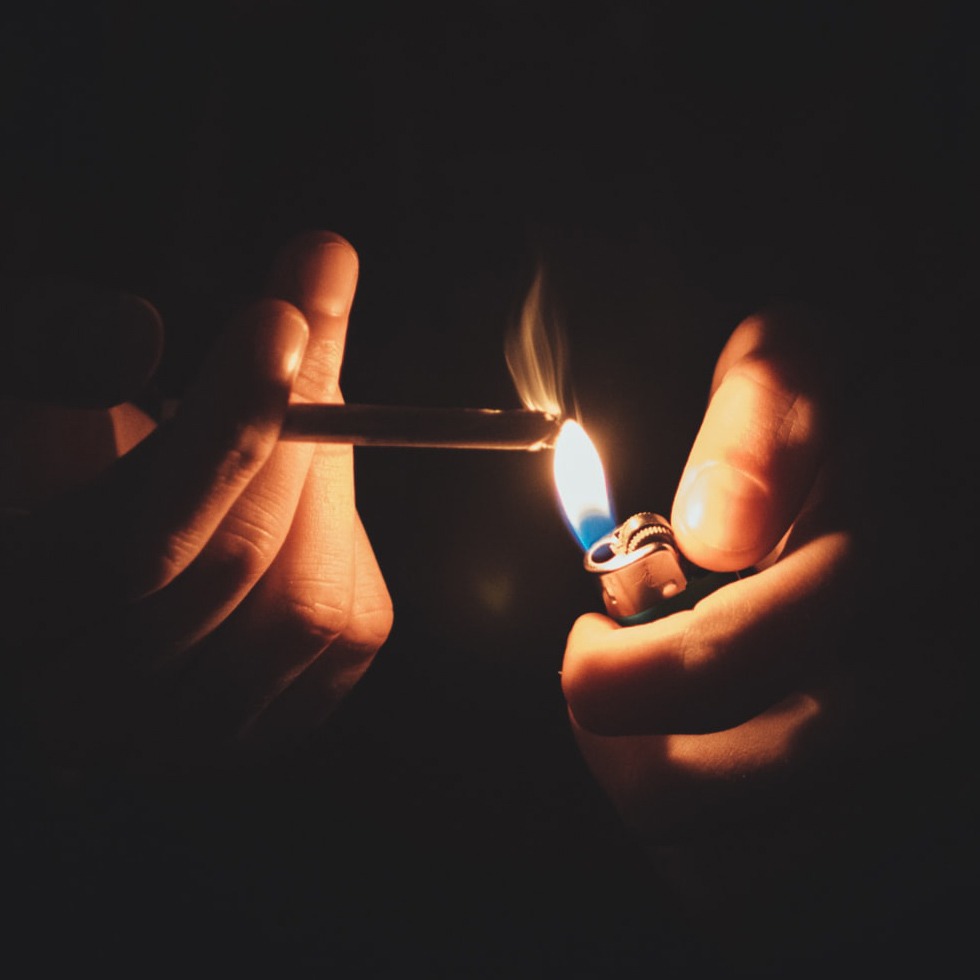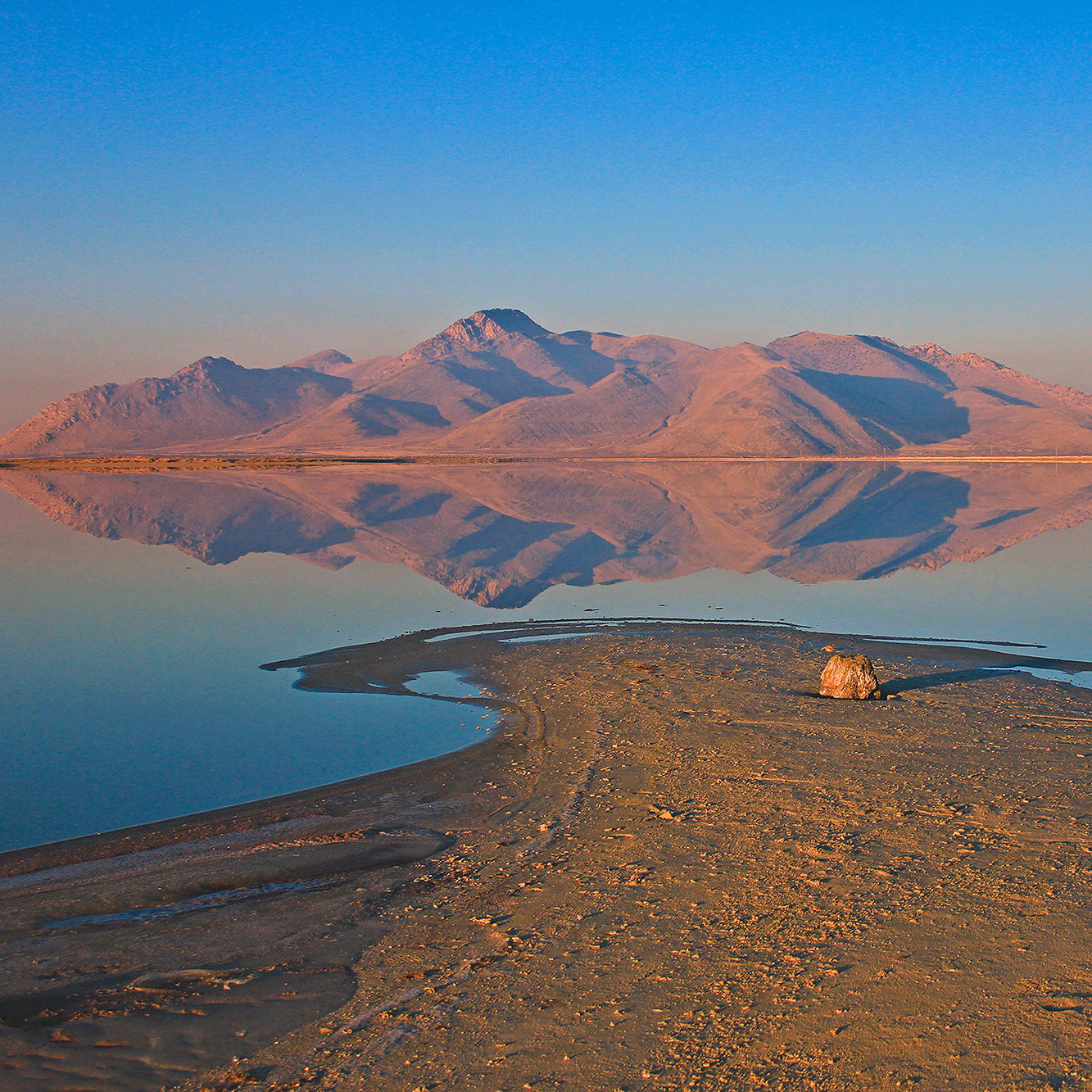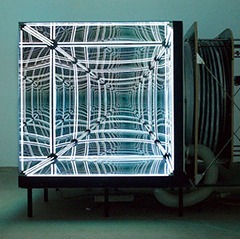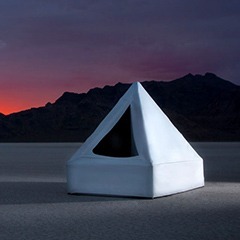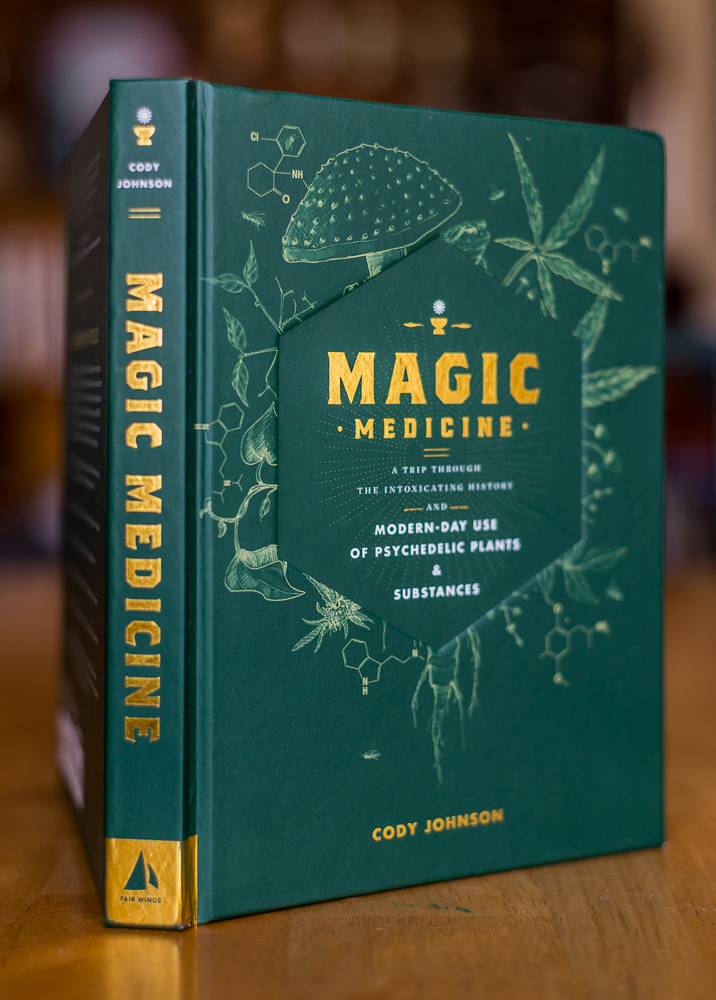Underwater Tripping 5 Hours at the Bottom of a Minnesotan Lake
by Psychedelic Frontier on Oct 7, 2014 4 CommentsToday’s guest post is by Alex Beyman, an author, diving enthusiast, and psychonaut. His story of tripping at the bottom of a Minnesota Lake was originally posted to Reddit’s /r/drugs forum.

Art by Hilario Isola e Matteo Norzi
Note: This is not a how-to guide. I do not condone irresponsible diving. I urge readers not to try diving without scuba certification and an understanding of the risks diving entails, especially where DIY gear is concerned. If you’re not careful it’s easy to kill yourself, so don’t try anything similar until you’re certified to dive conventionally.
A few years ago I developed an obsessive interest in diving technology. Submarines, habitats, torpedoes, exoskeletons, you name it. I knew I wanted to try diving but when I read about the regulatory barriers to simply buying gear and diving, I got frustrated and, in keeping with my nature, instead went and built a diving helmet. (Later on, I realized there was good reason for these regulatory barriers. Basic pneumatic principles are not as intuitively obvious to everyone as I wrongly assumed then.)
Even at ten I was devising diving helmet schematics and plans for a self-sufficient habitat at the bottom of the lake with huge dome windows.
Diving this way is safer than it sounds provided you have someone manning the compressor and managing the umbilical. Another vital component is the air filter. A filter is necessary to ensure what you’re breathing is as clean and dry as it gets. Any kind of contaminant, however slight, can cause serious health problems at depth. Because of dangers like these, it’s imperative to research thoroughly before building a helmet.
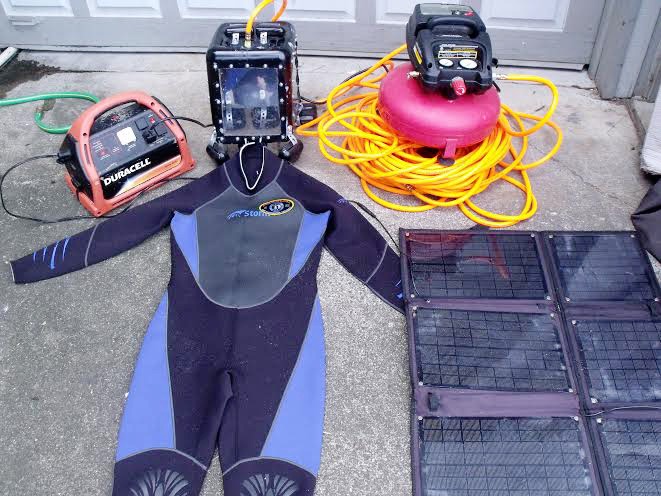
My diving gear: an Uninterrupted Power Supply, DIY Diving Helmet, air compressor with hose, and wetsuit.
There is an experience you get with helmet diving that cannot be had with scuba. Your head is in air, peering out through large windows into water — a very cool Jules Verne feeling. You breathe naturally with no regulator in your mouth – the helmet, technically, is the regulator — and you can speak via wired intercom with the surface. Feels a bit like walking on the moon in a spacesuit as you’re necessarily upright and can bounce a little with reduced gravity due to buoyancy. But you can’t get very far horizontally like this because you’re tethered to the compressor on the surface, which is plugged into the electrical grid.
What I discovered is that helmet diving is ideal for stationary observation. I could set up a chair maybe fifteen feet deep, sit still, and wait. After the initial disturbance, marine life would resume its normal routine all around me. Because the compressor is tied to the electrical grid (with a UPS in case of momentary outages), you can just sit there in your comfy chair as long as you like watching fish go by. If you designed the helmet for it, you can reach up inside to wipe away condensation and snack on granola bars from ziplock bags. You can literally spend all day underwater if you want.
Which is what I did today, high off my tits.
[pullquotecenter]I’ve lived my life with the philosophy that who I am as an adult should impress and realize the dreams of 10 year old me.[/pullquotecenter]
I dosed 2mg of 25C-NBOMe at 11:30am. I waited for the come-up to end before getting in the water as I had reservations about combining cold water and vasoconstriction. I’m pretty far north in a cabin I’ve spent summers at since I was a toddler. All of the fondest memories of my formative years took place here. Even at ten I was devising diving helmet schematics and plans for a self-sufficient habitat at the bottom of the lake with huge dome windows. It took me another decade and a half to develop the understanding necessary to make good on any of it, but damned if I didn’t actually go through with it. Those drawings of my rad lake bottom base with hydroponic gardens are in the bottom of a drawer in the cabin somewhere. I’ve lived my life with the philosophy that who I am as an adult should impress and realize the dreams of 10 year old me.
I was raised on a diet of Isaac Asimov, Frederik Pohl, and other classic science fiction authors, so I got my moral instruction from omnicompotent, unflappably rational protagonists who always solved their problems by studying them carefully and devising a technological solution. This appealed to me more than the Flash Gordon “crash land, punch everything to death that you cannot fuck, fuck everything you cannot punch, kill a poorly disguised racial caricature of a Chinese man in a dress, then return to Earth for a parade” approach.
It’s thoughtful young adult sci-fi that teaches you anything is possible if you are unstoppable in your determination, methodical and analytical in your approach and, ideally, a little bit mentally unhinged. This is how I wound up tripping balls at the bottom of a Minnesotan lake.
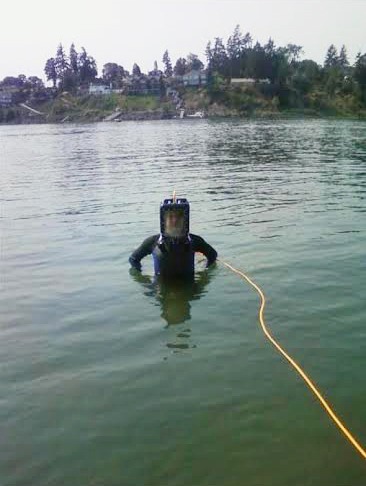
Once underwater, the first thing was to get my breathing under control. It was a bit of a trek from shore and I was very conscious of my blood CO2 levels. I forgot the fucking chair too. So I sat cross-legged on the lakebed and waited, eyes wide open, to see what might happen. The visibility is poor, less than ten feet, but what you want to see down there isn’t far away so it doesn’t matter.
The gentle undulating surface resembled a stormy sky overhead, casting down radiant golden beams of light. There was a gradient from gold to deep green with depth. I watched an ever-present cloud of little floating organic particulates in which my brain began to see false organization. They were atomic particles with vectors between them, like models of molecules a well-intentioned grandmother might give you as an educational gift one Christmas.
This medium was in constant motion around me so these hallucinatory molecular connections were moving, three dimensionally, rotating on both axes along with the water. It felt immensely good to accurately track this motion, and I could conceive of it happening around me in terms of water atoms conveying wave motion to each other — with me immersed in all of it.
[pullquoteleft]The predators we see down there, nearly unchanged since they snacked on and terrified our primordial gilled ancestors, are now our prey.[/pullquoteleft]That’s when the process of abiogenesis started unfolding before my eyes. I could see tiny little organisms swimming from speck to speck. That’s their whole world and what they do with their day. In my mind I could see rudimentary prebiotic chemical replicators stirred around like these particles. I watched lipid molecules form bilayer films on the surface of gas bubbles — lipids are hydrophobic on one end and hydrophilic on the other, I recalled, such that they self-configure into a bilayered membrane around bubbles of gas.
When the gas escaped, the shell of lipids remained and wherever a chemical replicator was caught inside, it found a sheltered environment where it could self-copy with fewer errors. This allowed it to become considerably more complex than if it were unprotected. Self-copying peptides gave way to RNA, then DNA. At the same time a separate microorganism began visiting these protocells, living within them, feeding off their waste. Eventually trapped in an ongoing symbiosis, they became mitochondria. The green specks now resembled stars in a galaxy I was seeing edge-on, so that they were denser at the ‘horizon’ which swirled and pulsated a deep rich green.
A little fish swam up to me while I was deep in thought. The larger ones I’d seen earlier didn’t get close because of the bubble plume, but this little fucker got right up in my face. For a while I felt like this was first contact. For him, encountering something vastly larger and from a realm outside of his experience, face to face. “What the fuck are you doing here?” he seemed to say.
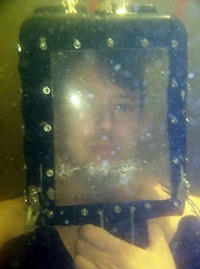
Me in my helmet
The fish raised an interesting point. (There’s a sentence you’ll only ever find yourself writing as a consequence of mind-altering substances.) What was I doing there? Well, it was easy. And comfortable. The water supported my body and I felt at home. The little swimming organisms were even more at home — but unlike me, they were wholly dependent on their medium. The conditions in this lake and how slowly they change is what permits them to make a good living here, and they cannot control that, nor can they leave the lake. Too hard. Their bodies are too soft, the land too hot and dry. I began evolving along with them in my mind. Developing a spine, rudimentary legs and lungs like a lungfish, mudskipper, or Tiktaalik.
I began to see shadowy monstrous forms all around me. What I thought was a civil war cannon then resolved instead into gigantic tarantula legs, moving around me. At their center, a H.R. Gigeresque mass of skeletal tentacles, writhing and drawing closer by the second. This is something I hadn’t counted on. I manage bad trips reasonably well by staying grounded in materialism, but these creatures seemed immune to rational disbelief. I was surrounded. As I gaped at the nearest one, some kind of orifice opened like a six-petalled flower. Inside was a massive eye with a +-shaped pupil. It looked at me and narrowed. “You don’t belong here. Leave.”
I wasn’t about to argue. As I trudged onward towards shore I thought of our ancestors fleeing incomprehensibly terrifying, massive aquatic predators that even today trouble our thoughts. To escape them we had to stiffen up. Become stronger, able to survive out of water.
I had second thoughts at this point. I had felt so incredibly at home in the water. Like it would be much harder to drag myself out of it with all the heavy sopping wet gear than simply to live there indefinitely as a purely aquatic organism.
[pullquotecenter]The long air hose was to me like the umbilical of an embryo. I was about to be born from the water, onto land.[/pullquotecenter]
Too easy. I’d be extinct when conditions in the lake changed. I had to become harder and crucially, learn to survive independent of any medium. Because after committing to land we transcended our dependence on one medium — we can return to the water as needed for farming, energy, and mineral extraction purposes. We didn’t really lose that ability. But the predators we see down there, nearly unchanged since they snacked on and terrified our primordial gilled ancestors, are now our prey.
If I could just make the few steps up out of the water to land, the rest would follow. Amphibians. Reptiles. Mammals. Then humans, who can build and propagate their own ideal growth substrate wherever they want to explore, not limited as fish are to the lake. If I could crawl out of the water onto land, and breathe, I had to. The long air hose was to me like the umbilical of an embryo. I was about to be born from the water, onto land.
Lugging an armful of hose I’d coiled up on the way, I emerged from the comforting, supportive medium of the water. I lifted the helmet off and breathed deeply, then shut off the compressor. After stripping down to swimsuit, I lay on the dock and let the sun dry me while I watched dancing skeletal configurations of atoms behind my eyelids. Later, on the trek up the hill to the cabin, I appreciated the beauty of the forest and felt glad I’d forced myself to commit to leaving the water. I was dry now and unencumbered with gear, and now finally felt at home on land again.
That seemed like a very fundamental barrier life either crosses or doesn’t which determines a species’ long-term survival: medium-dependent, which is comfortable and easy (aquatic monsters notwithstanding) or medium-independent which is extremely difficult, arduous and at times painful to achieve. Which we still haven’t fully achieved. I could imagine our descendants, some form of self-replicating intelligent machine life, no longer dependent on Earthlike conditions to support them. Now harder, stronger, thriving in a radiation-blasted vacuum but still able to descend to the surface of Earthlike worlds as needed for practical reasons. Or maybe as a kind of diving. To remember what it was like to live down here.
If you enjoyed this story, check out Alex Beyman’s books on Amazon!
Liked this post? Subscribe to my RSS feed to get much more!





